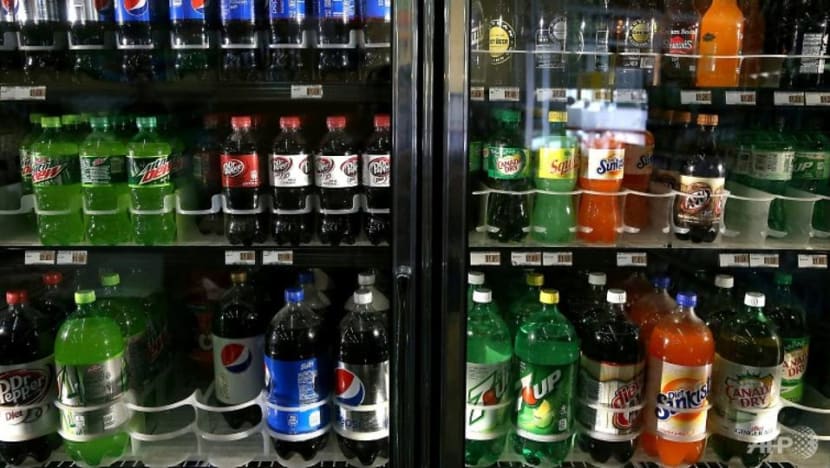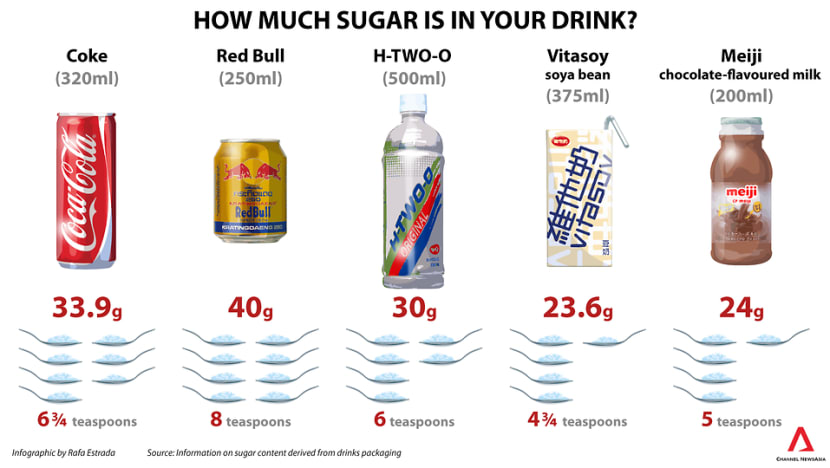Diabetes risk, weight gain: The possible bitter effects of too many sugary drinks

File photo of soft drinks. (Photo: AFP)
SINGAPORE: Mr Ritz Jaafar consumes two cans of soft drink every day - a habit the 44-year-old started as a teenager.
The two cans he has now are a far cry from about a year ago, when he was downing seven to eight cans in a day. A wake-up call came in the form of a high blood sugar reading when he went for a medical check-up.
While aware that the sugary drinks could be paving the path to diabetes, Mr Ritz has not been able to cut them out from his daily routine.
“I am addicted to the caffeine and the sugar rush,” the bar manager told Channel NewsAsia.
The drinks that Mr Ritz prefers contain high amounts of sugar, with a 320ml can of regular Coca Cola containing 33.9g of sugar, which is equivalent to six and three-quarters teaspoons. Kickapoo does not provide information on the total amount of sugar in a can of the fruity beverage.
READ: 7 major soft drinks manufacturers in Singapore to reduce sugar content in drinks
His daily habit means that he consumes more than 12kg of sugar in a year, equivalent to 2,400 teaspoons, just from these drinks.

This limit includes sugar added to beverages as well as food such as cakes and candies. According to HPB, drinking an additional 250ml of sugar-sweetened beverages every day increases a person’s risk of diabetes by 18 to 26 per cent.
It is such sugar intake that the Ministry of Health (MOH) is working to reduce among Singaporeans in its continued war against diabetes. Almost half a million Singaporeans live with diabetes, higher than the global prevalence.
READ: Singapore’s approach to war on diabetes 'generally in right direction': Health Minister Gan Kim Yong
The authority has started consulting the public on four possible measures that include banning and taxing some pre-packaged sugar-sweetened beverages in a bid to cut overall sugar intake. On average, Singaporeans currently consume more than 1,500 teaspoons of sugar from pre-packaged sugar-sweetened beverages every year, MOH said.
WEIGHT GAIN, TOOTH DECAY AND POOR BLOOD SUGAR CONTROL POSSIBLE EFFECTS OF TOO MANY SUGARY DRINKS
Chief dietitian at Mount Elizabeth Novena Hospital Natalie Goh said that such sugary beverages are bad for health if consumed in excessive amounts as they lead to weight gain and can contribute to poor blood sugar control. Obesity is a risk factor of Type 2 diabetes, she added.
Dietitian Naras Lapsys said that there is research to show that a high intake of sugar can cause chronic inflammation in the body, and therefore is linked to health problems like heart disease.
Read: Coca-Cola to help tackle diabetes scourge, but sugar tax won't help: CEO
Both the dietitians pointed out that the sugar-sweetened drinks only offer sugar calories, but contain no other beneficial nutrient.
In Singapore, according to numbers on HealthHub, an HPB website, two in three new kidney failure cases were due to diabetes, one in two people who had a heart attack had co-existing diabetes and two in five people who had a stroke had co-existing diabetes.
Mr Lapsys added that other beverages apart from fizzy drinks would be contributing empty calories, as they typically contain added sugars. Among such drinks are those which are fruit- or yoghurt-based.
The experts urged the public to choose water over sugary drinks.
“Sugar intake whether in the form of sugar added during food preparation or in beverages, should be limited to no more than nine teaspoons per day in adults,” Ms Goh said.














